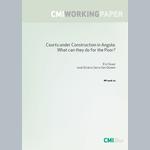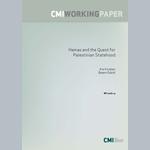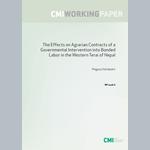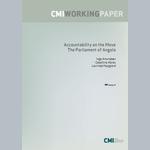CMI Working Papers

CMI Working Paper | 2006
Courts under Construction in Angola: What can They do for the poor?
This paper is about the role that may be envisioned for the courts in Angola with respect to the poor. Looking at the period from 1992 - 2004, it analyses...
Elin Skaar and José Octávio Serra Van-Dúnem (2006)
Bergen: Chr. Michelsen Institute (CMI Working Paper WP 2006: 20)

CMI Working Paper | 2006
Palestinian Women: Is there a Unitary Conception of Rights?
What are "ordinary" Palestinian women's views on women's rights? How do they perceive their own rights situation? The term "ordinary" in this respect refers to rural women outside of political...
Hilde Kjøstvedt (2006)
Bergen: Chr. Michelsen Institute (CMI Working Paper WP 2006: 19) 14 p.
CMI Working Paper | 2006
Is Bonded Labor Voluntary? Evidence from the Liberation of the Kamaiyas in the Far-Western Region of Nepal
The UN estimates that 20 million are held in bonded labor. Several economic analyses assert that bonded laborers accept these contracts voluntarily, which could imply that a ban would make...
Espen Villanger (2006)
Bergen: Chr. Michelsen Institute (CMI Working Paper WP 2006: 16) 25 p.
CMI Working Paper | 2006
Local Revenue Mobilization in Urban Setttings in Africa
The growth of Africa's towns and cities has outpaced local authority capacity in terms of management, infrastructure, and financing. Many African towns and cities are now facing a governance crisis....
Odd-Helge Fjeldstad (2006)
Bergen: Chr. Michelsen Institute (CMI Working Paper WP 2006: 15) 18 p.

CMI Working Paper | 2006
Hamas and the Quest for Palestinian Statehood
The Islamic Resistance Movement’s (Hamas) big win in the elections to the Palestinian Legislative Council (PLC) marks the end of Fatah’s political hegemony. Having trumped Fatah in the elections, Hamas faces several...
Are Knudsen, Basem Ezbidi (2006)
Bergen: Chr. Michelsen Institute (CMI Working Paper WP 2006:14) 19 p.
CMI Working Paper | 2006
Of Oranges and Bananas: The 2005 Kenya Referendum on the Constitution
On 21 November 2005, a referendum on a proposed new constitution was held in Kenya, which was conducted in a peaceful and orderly manner. The poll represented the will of...
Bård Anders Andreassen and Arne Tostensen (2006)
Bergen: Chr. Michelsen Institute (CMI Working Paper WP 2006: 13) 8 p.
CMI Working Paper | 2006
Why Firms should not always Maximize Profits
Though corporate social responsibility (CSR) is on the agenda of most major corporations, corporate executives still largely support the view that corporations should maximize the returns to their owners. There...
Ivar Kolstad (2006)
Bergen: Chr. Michelsen Institute (CMI Working Paper WP 2006: 11) 7 p.
CMI Working Paper | 2006
Parliamentary-Executive Relations in Malawi 1994-2004
This article addresses the relationship between the legislative and executive branches of government in Malawi during the multi-party era from 1994 until 2004. The argument is threefold. First, the presidential...
Nandini Patel and Arne Tostensen (2006)
Bergen: Chr. Michelsen Institute (CMI Working Paper WP 2006: 10) 18 p.
CMI Working Paper | 2006
Towards Multiparty System in Uganda: The Effect on Female Representation in Politics
Scholars, politicians and women activists today share a concern for the limited representation of women in different political bodies. Statistics comparing female representation in sub-Saharan African legislatures suggest that a...
Kari Nordstoga Hanssen (2006)
Bergen: Chr. Michelsen Institute (CMI Working Paper WP 2006: 9) 16 p.
CMI Working Paper | 2006
Kingship in Uganda. The Role of the Buganda Kingdom in Ugandan Politics
This article aims at providing a framework to understand the role of the Buganda kingdom in contemporary Ugandan politics, and more specifically how the Buganda question has influenced political debates...
Cathrine Johannessen (2006)
Bergen: Chr. Michelsen Institute (CMI Working Paper WP 2006: 8) 14 p.
CMI Working Paper | 2006
Is Bonded Labor Voluntary? A Framework against Forced Work
UN estimate that 20 million are held in bonded labor. Several economic analyses assert that bonded laborers accept these contracts voluntarily, which could imply that a ban would make such...
Espen Villanger (2006)
Bergen: Chr. Michelsen Institute (CMI Working Paper WP 2006: 7) 18 p.

CMI Working Paper | 2006
The Effects on Agrarian Contracts of a Governmental Intervention into Bonded Labor in the Western Terai of Nepal
We study an effective intervention into a specific form of bonded labor. The intervention led to a shift in agrarian contracts, from bonded labor to sharecropping. By comparing the pre-...
Magnus Hatlebakk (2006)
Bergen: Chr. Michelsen Institute (CMI Working Paper WP 2006: 6) 40 p.
CMI Working Paper | 2006
Beaten by Bribery: Why not Blow the Whistle?
A recent business survey in Norway reveals that firms rarely react to corruption, even when they have lost important contracts as a result. This disinclination to take action is explored...
Tina Søreide (2006)
Bergen: Chr. Michelsen Institute (CMI Working Paper WP 2006: 5) 25 p.
CMI Working Paper | 2006
Business Corruption, Uncertainty and Risk Aversion
The presence of business-corruption in a market provokes firms to make choices between legal business approaches and illegal bribery. The outcome of a chosen strategy will usually be uncertain at...
Tina Søreide (2006)
Bergen: Chr. Michelsen Institute (CMI Working Paper WP 2006: 4) 30 p.
CMI Working Paper | 2006
Exploring the Research-Policy Linkage: The Case of Reforms in Financing Primary Education in Tanzania
Tanzania abolished school fees in primary schools as from 2002. This move was made possible because of shifts in the policy of major donors, not least the World Bank. In...
Alf Morten Jerve (2006)
Bergen: Chr. Michelsen Institute (CMI Working Paper WP 2006: 3) 21 p.
CMI Working Paper | 2006
Bribes, Taxes and Regulations: Business Constraints for Micro Enterprises in Tanzania
This paper analyses the business environment for micro enterprises in Tanzania based on survey data. The primary objective of the study is to identify major constraints facing the firms' business...
Odd-Helge Fjeldstad, Ivar Kolstad and Knut Nygaard (2006)
Bergen: Chr. Michelsen Institute (CMI Working Paper WP 2006: 2) 17 p.
CMI Working Paper | 2006
Is it Wrong to Rank? A Critical Assessment of Corruption Indices
This paper emphasizes the importance of collecting information on corruption, while still stressing critical aspects of the most applied sources of such information, the cross-country composite corruption indices. Are these...
Tina Søreide (2006)
Bergen: Chr. Michelsen Institute (CMI Working Paper WP 2006: 1) 13 p.
CMI Working Paper | 2005
Filling "the Gap": Lessons well learnt by the Multilateral Aid Agencies
An assumed gap between relief and development assistance was widely discussed in the 1990s. Urged to "mind the gap", the multilateral aid agencies adjusted. In terms of the initial learning...
Astri Suhrke and Arve Ofstad (2005)
Bergen: Chr. Michelsen Institute (CMI Working Paper WP 2005: 14) 12 p.
CMI Working Paper | 2005
Aid, Growth and Peace: A Comparative Analysis
The paper examines patterns of post-conflict aid in a sample of 14 countries, with in-depth qualitative analysis of seven cases. The study shows that - contrary to the findings of...
Astri Suhrke and Julia Buckmaster (2005)
Bergen: Chr. Michelsen Institute (CMI Working Paper WP 2005: 13) 20 p.

CMI Working Paper | 2005
Accountability on the Move. The Parliament of Angola
The Parliament of Angola was established and elected in 1992 in a watershed election that coincided with the peace process in Angola and the democratisation process in much of Africa....
Inge Amundsen, Cesaltina Abreu and Laurinda Hoygaard (2005)
Bergen: Chr. Michelsen Institute (CMI Working Paper WP 2005: 11) 27 p.